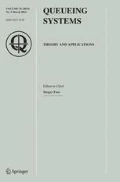Abstract
In this paper the steady-state behavior of a closed queueing network with multiple classes and large populations is investigated. One of the two nodes of the network simply introduces random delays and the discipline in the other node is discriminatory processor sharing. The network is not product-form, so not even the steady-state behavior is known. We assume that the usage is moderately heavy, and obtain two-term asymptotic approximations to the mean number of jobs, and the mean sojourn time, of each class of jobs in the processor node. We also obtain the leading term in the asymptotic approximation to the joint distribution of the number of jobs in the processor node, which is a zero-mean multivariate Gaussian distribution around a line through the origin.
Similar content being viewed by others
References
M. Abramowitz and I.A. Stegun,Handbook of Mathematical Functions (National Bureau of Standards, Washington, DC, 1964) p. 886.
W.B. Davenport, Jr. and W.L. Root,An Introduction to the Theory of Random Signals and Noise (McGraw-Hill, New York, 1958) p. 151.
G. Fayolle, I. Mitrani and R. Iasnogorodski, Sharing a processor among many job classes, J. ACM 27 (1980) 519–532.
L. Kleinrock, Time-shared systems: a theoretical treatment, J. ACM 14 (1967) 242–261.
L. Kleinrock,Queueing Systems, vol. 1: Theory (Wiley, New York, 1975) p. 17.
S.S. Lavenberg and M. Reiser, Stationary state probabilities at arrival instants for closed queueing networks with multiple types of customers, J. Appl. Prob. 17 (1980) 1048–1061.
W. Magnus, F. Oberhettinger and R.P. Soni,Formulas and Theorems for the Special Functions of Mathematical Physics (Springer, New York, 1966) p. 12.
J. McKenna, D. Mitra and K.G. Ramakrishnan, A class of closed Markovian queueing networks: integral representations, asymptotic expansions and generalizations, Bell Sys. Tech. J. 60 (1981) 599–641.
D. Mitra and J.A. Morrison, Asymptotic expansions of moments of the waiting time in closed and open processor-sharing systems with multiple job classes, Adv. Appl. Prob. 15 (1983) 813–839.
D. Mitra and A. Weiss, A closed network with a discriminatory processor-sharing server,1989 ACM Sigmetrics and Performance '89, Performance Evaluation Review, vol. 17, no. 1 (May 1989) pp. 200–208.
I. Mitrani and J.H. Hine, Complete parametrized families of job scheduling strategies, Acta Inform. 8 (1977) 61–73.
J.A. Morrison, Conditioned response-time distribution for a large closed processor-sharing system with multiple classes in very heavy usage, SIAM J. Appl. Math. 48 (1988) 1493–1509.
J.A. Morrison and D. Mitra, Heavy-usage asymptotic expansions for the waiting time in closed processor-sharing systems with multiple classes, Adv. Appl. Prob. 17 (1985) 163–185.
M. Schwartz,Telecommunication Networks: Protocols, Modeling and Analysis (Addison Wesley, Reading, MA, 1987).
K.C. Sevcik and I. Mitrani, The distribution of queueing network states at input and output instants, J. ACM 28 (1981) 358–371.
Author information
Authors and Affiliations
Rights and permissions
About this article
Cite this article
Morrison, J.A. Asymptotic analysis of a large closed queueing network with discriminatory processor sharing. Queueing Syst 9, 191–213 (1991). https://doi.org/10.1007/BF01158797
Received:
Revised:
Issue Date:
DOI: https://doi.org/10.1007/BF01158797



